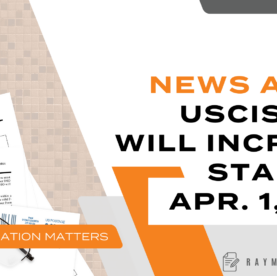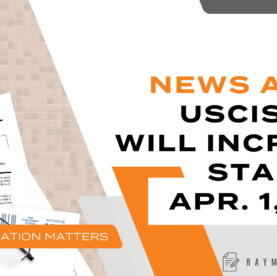Immigration Weekly Round-Up: Applications for Employment Authorization Now Online for Students; Biden Reaches Deal To Stem Immigration at Border; Central American Countries Agree to Anti-Corruption Plan

F-1 Students Seeking Employment Authorization Can File Online
On April 12, 2021, the U.S. Citizenship and Immigration Services (“USCIS”) announced that F-1 students seeking Optional Practical Training – more commonly known as “OPT” – will be able to file their Form I-765, Application for Employment Authorization, online through their account with USCIS. Tracy Renaud, Senior Official Performing the Duties of USCIS Director, stated “USCIS remains committed to maximizing our online filing capabilities,” noting that online submission makes processing faster and easier for both the applicant and USCIS and that eleven USCIS forms are now available for electronic filing.
The online filing option allows applicants to receive notices about their application, as well as check on case status, online instead of through the mail. However, only students filing under certain categories related to OPT may file their employment authorization applications online; if the applicant believes they are eligible for employment, they check the applicable federal regulations or consult with an attorney before completing a submission.
Biden Administration Settles on Border Plan with Mexico, Honduras, and Guatemala
The Biden administration has reached a deal with Mexico, Honduras, and Guatemala as part of an effort to increase border security and to reduce the number of immigrants, including undocumented children, from arriving at the United States/Mexico border.
These three countries have agreed to deploy a total of over 18,000 law enforcement officers – 10,000 from Mexico, 7,000 from Honduras, and 1,500 from Guatemala – throughout their borders, as well as set up checkpoints on major travel routes, to deter large contingents of traveling migrants. Jen Psaki, White House Press Secretary, stated that the agreement was the result of “a series of bilateral discussions.” Psaki further indicated that the objective of the troops was “to make it more difficult to make the journey and make crossing the borders more difficult.”
This plan is part of a larger overall strategy to address an increase in immigration and detentions at the southern border – undocumented immigration rose in the last year of the Trump administration and has continued under the Biden presidency.
Large Scale Plan to Reduce Corruption in Central America
In another attempt to stem undocumented immigration, the Biden administration has announced a multi-billion dollar plan with the presidents of Guatemala, Honduras, and El Salvador to crack down on corruption in the region. This plan is part of a January promise from the Biden administration to set up a regional task force in those countries to fight corruption, including by threatening freezes on the U.S. bank accounts of officials engaging in fraud, bribery, or other forms of corruption.
While corruption is just one of many reasons causing people to flee Central America – others include gang control and violence, economic depression, and natural disasters – it nevertheless remains a very strong factor. Guatemala, Honduras, and El Salvador have publicly pledged to eradicate government corruption, and the Biden administration is instructing these Central American countries to support efforts critical to successful democracies, including free elections, an independent judiciary, and the protection of human rights for all people.
If you have any questions about this blog post or any other immigration concerns, please feel free to contact me at wcmenard@norris-law.com or 484-544-0022.





